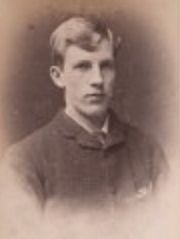Malcolm Eadie Fraser

The life of Malcolm John Eadie Fraser, aka Eadie Fraser, was short and possibly, indeed certainly, quite unnecessarily tragic. He was the son of an Edinburgh mother and Church of Scotland minister from Elgin-shire, who had been sent to serve the Presbyterian flock in the town of Goderich on Ontario shore of Lake Huron in Canada. So that was where in 1860 Eadie was born. But within a decade the father was recalled, eventually to be given charge of a new kirk in Cumberland St. on Glasgow's Southside.
And it was there that the young Fraser grew up, eventually working as a warehouseman and caught up in his teens and like many in the teeming streets and rancid slums around him in the fever for football. Moreover, he had talent. By eighteen he, a "graceful" forward, was turning out for Queen's Park. At twenty and three weeks he was capped, the first of five in three seasons, when only two internationals were played a year. All the signs were of a long and successful career stretching in front of him.
However, sometime between March 1883 and January 1884 it was all to come crashing down. And the reason was his birth. At a still unidentified point apparently between 11th and 25th March 1882 the Scottish Football Association changed the qualification rules. Residence in Scotland was no longer enough. Only a Caledonian birth counted. The result was that the uncapped Queen's Park left-back was brought into the national team but swopped to the right with eventually again uncapped Walter Arnott, also Queen's Park but a twenty-year old reserve, brought in on the left. Meanwhile the incumbent right-back and previous Scotland captain was dropped on the grounds that he, Andrew Watson, had been born in Guyana.
Yet, Canadian Eadie played on. He won a fourth and fifth cap until, perhaps, someone pointed to the inconsistency, at which point he too was dropped. One can imagine the effect. He was barely twenty-three but playing for his country-by-birth-right, if not birth, was over. And whilst he played on at his club for a few months more by 1884 not only had he stepped away from the game but would leave the country too.
He took work in West Africa. It was probably the worst thing he could have done. Within eighteen months tuberculosis, probably, and perhaps due to his childhood and youth in Glasgow's Southside where it was incipient, took hold. He attempted essentially to counter it by looking to a better climate than either where he was or at home and boarded a ship for Sydney, Australia, landing there about New Year 1886. But by the 8th January he was dead, passing away at not quite twenty-five in hospital to buried in the local Rookwood Cemetery. Who paid for the funeral is unknown but the grave-location must have been because the following year an attempt was made to raise money to mark it with a memorial. However, it came to nothing and not just a great footballing talent but the moment had been lost.
Birth Locator:
1860 - Goderich, Ontario, Canada
Residence Locations:
1861 - Goderich, Ontario, Canada
1871 - 22, Montgomery Place, Glasgow
1881 - 22, Cumberland St., Laurieston, Glasgow
1886 - Sydney, Australia
Death Locator:
1886 - Prince Alfred Hospital, Sydney, Australia
Grave Locator:
Rookwood Cemetery, Sydney, Australia (Unmarked)
Back to The Glasgow Southside Trail
or the SFHG Home page